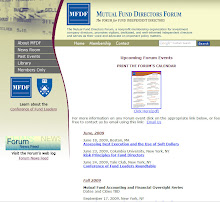At an open meeting today, the SEC proposed reforms to the way money market mutual funds are regulated. These new proposed regulations would tighten restrictions on money funds and are aimed at increasing their stability and preventing the kind of sudden vulnerability they suffered last fall due to liquidity problems and market events. Though the full text of the proposals will not be available for several weeks, based on the statements of the Commission staff at the open meeting, along with the questions posed by the Commissioners and the answers given, the proposals include recommendations for changes to tighten the risk limiting parts of Rule 2a-7, including credit quality, maturity, and liquidity.
The rule proposal also seeks to lessen the effect when a particular fund breaks the buck and decides to liquidate. The proposal would require all money market funds to adjust their systems to allow redemptions at an amount less than $1.00 per share. In addition, boards would be given the ability to suspend redemptions if a money market fund breaks the buck and liquidates. The goal of this change is to protect fund shareholders and the credit markets from fire sales when a fund breaks the buck and faces runs. Finally, the proposal would remove the need for funds to seek routine relief from the Commission staff to allow an affiliate to purchase distressed securities from the fund when such purchases are in the best interests of a fund, while preserving protections against such transactions that would be harmful.
In addition to specific proposals to change Rule 2a-7, the release will also seek comment on potential future changes to money market funds. The release will ask for comments from the industry on:
An archived webcast of today's open meeting will be available later today or tomorrow via the SEC's website: http://sec.gov/cgi-bin/goodbye.cgi?www.connectlive.com/events/secopenmeetings/
- Credit Quality. In order to improve credit quality, money market funds would no longer be permitted to invest in Tier 2 securities.
- Maturity. The dollar –weighted average maturity of the money market fund could not exceed 60 days (the current rule is 90 days). In addition, in order to limit longer-term floating rate securities, the rule proposal would not permit money market funds to have a weighted average life limit of greater than 120 days.
- Liquidity. Money market funds would be required to have a specified amount of assets in cash and other highly liquid securities to meet redemption requests. In addition, money market funds would be required to know their investors in order to identify particular investors that pose large redemption risks.
- Stress Testing. Mandatory stress testing would help money market funds anticipate areas of risk by requiring money market funds to undertake regular review of interest rate, credit, and redemption risk.
The rule proposal also seeks to lessen the effect when a particular fund breaks the buck and decides to liquidate. The proposal would require all money market funds to adjust their systems to allow redemptions at an amount less than $1.00 per share. In addition, boards would be given the ability to suspend redemptions if a money market fund breaks the buck and liquidates. The goal of this change is to protect fund shareholders and the credit markets from fire sales when a fund breaks the buck and faces runs. Finally, the proposal would remove the need for funds to seek routine relief from the Commission staff to allow an affiliate to purchase distressed securities from the fund when such purchases are in the best interests of a fund, while preserving protections against such transactions that would be harmful.
In addition to specific proposals to change Rule 2a-7, the release will also seek comment on potential future changes to money market funds. The release will ask for comments from the industry on:
- Whether stable net asset value should be abandoned in favor of a floating rate;
- Whether funds should be permitted to make redemptions in kind to institutional shareholders;
- The appropriate role of credit rating agencies. The questions with respect to credit rating agencies would include the possibility that boards would designate certain credit rating agencies (which would be routinely reevaluated) that the fund could rely on to make purchased decisions and use to monitor securities after purchase. The designation would be based on the NRSROs performance, accuracy etc; and
- How the rules may better address the risks of investing in SIVs and other asset backed securities.
An archived webcast of today's open meeting will be available later today or tomorrow via the SEC's website: http://sec.gov/cgi-bin/goodbye.cgi?www.connectlive.com/events/secopenmeetings/





